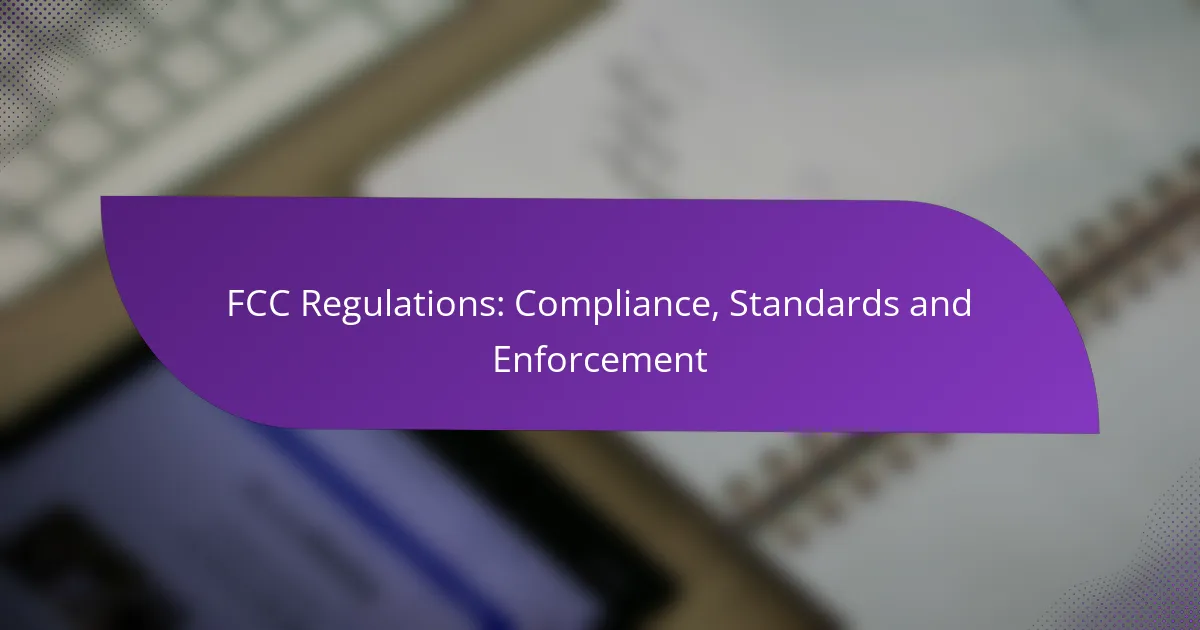The FCC regulations play a crucial role in ensuring that communication services operate within legal frameworks, promoting fair practices and consumer protection. Compliance with these standards requires organizations to regularly monitor their practices and implement systematic processes to meet established guidelines. Failure to adhere to these regulations can result in severe penalties, including fines and license revocation, underscoring the importance of maintaining compliance to safeguard public interest.
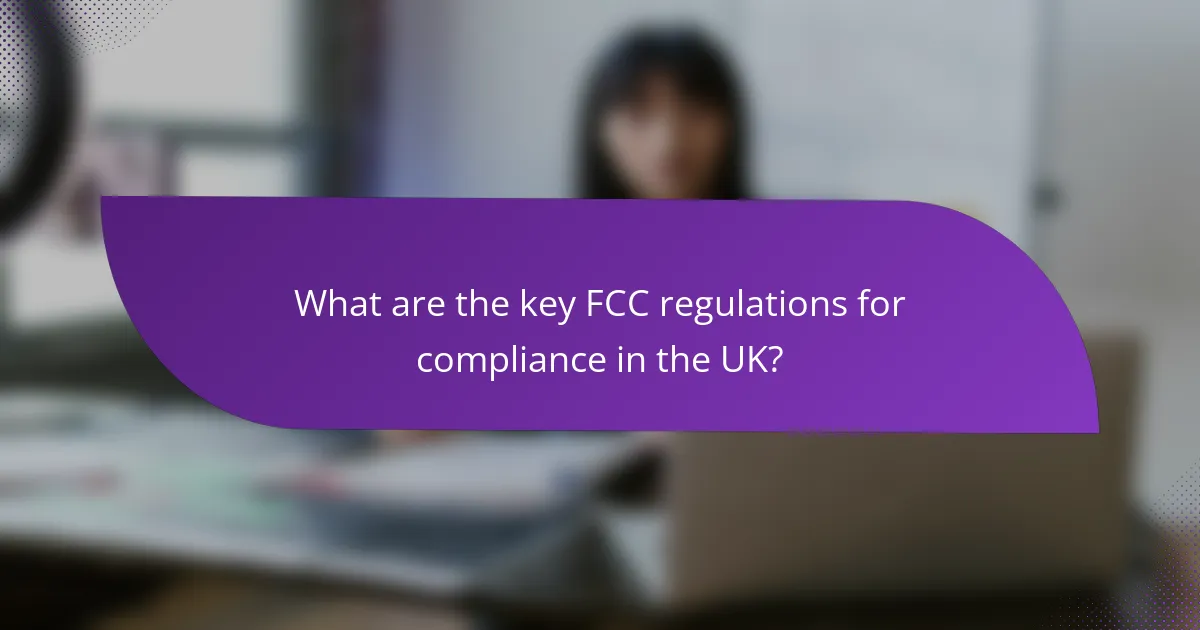
What are the key FCC regulations for compliance in the UK?
The key FCC regulations for compliance in the UK primarily revolve around ensuring that communication services operate within established legal frameworks. These regulations help maintain fair practices, protect consumers, and manage the radio spectrum effectively.
Communications Act 2003
The Communications Act 2003 is a significant piece of legislation that governs the regulation of electronic communications in the UK. It established the framework for licensing telecommunications operators and set out the duties of Ofcom, the UK’s communications regulator.
This Act covers various aspects, including the provision of services, consumer protection, and the promotion of competition. Operators must comply with specific conditions to ensure they meet the standards required for service delivery.
Wireless Telegraphy Act 2006
The Wireless Telegraphy Act 2006 regulates the use of radio frequencies in the UK. It requires individuals and organizations to obtain licenses for transmitting radio signals, ensuring that the spectrum is used efficiently and without interference.
Compliance with this Act is crucial for maintaining order in communications. Failure to obtain the necessary licenses can result in significant penalties, including fines and the confiscation of equipment.
General Conditions of Entitlement
The General Conditions of Entitlement set out the minimum requirements that communications providers must meet to operate legally in the UK. These conditions cover areas such as service quality, transparency, and consumer rights.
Providers need to ensure they adhere to these conditions to avoid enforcement actions from Ofcom. Regular audits and compliance checks can help maintain adherence to these regulations, protecting both the provider and consumers.
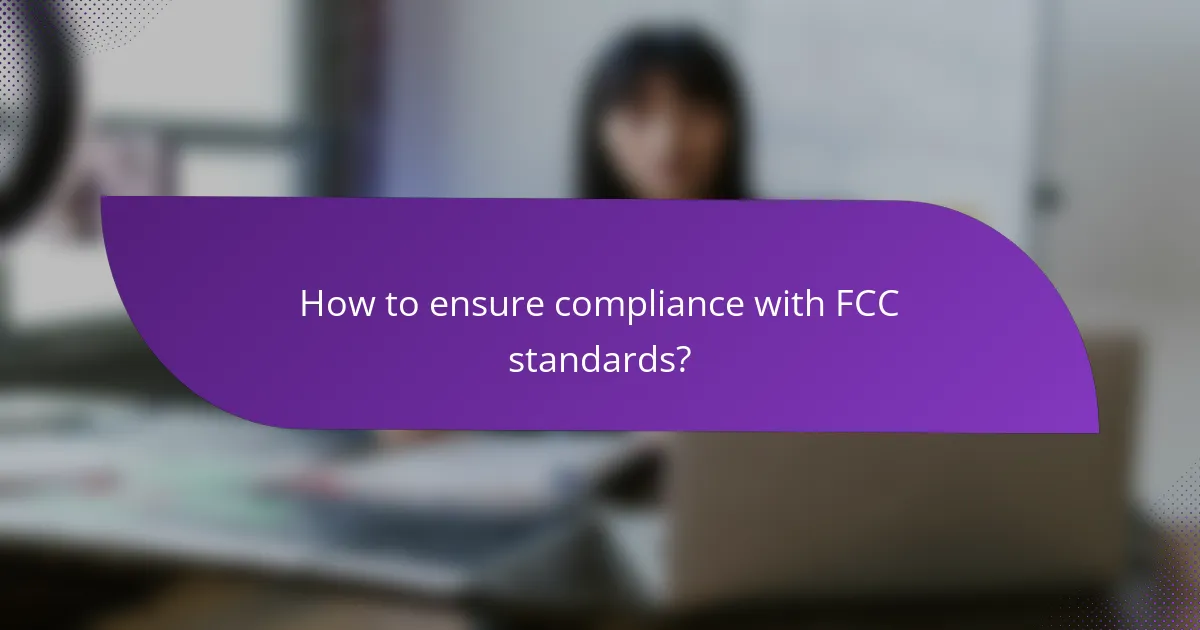
How to ensure compliance with FCC standards?
Ensuring compliance with FCC standards involves regular monitoring and adherence to established regulations. Organizations must implement systematic processes to evaluate their practices and ensure they meet the required guidelines.
Regular audits and assessments
Conducting regular audits and assessments is crucial for maintaining compliance with FCC standards. These evaluations help identify any gaps in adherence to regulations and provide an opportunity to rectify issues before they escalate.
Establish a schedule for audits, ideally on a quarterly or biannual basis, to ensure ongoing compliance. Utilize checklists tailored to FCC regulations to streamline the assessment process and ensure thorough coverage of all necessary areas.
Utilizing compliance management software
Compliance management software can significantly enhance an organization’s ability to meet FCC standards. These tools often include features for tracking regulatory changes, managing documentation, and automating reporting processes.
When selecting software, consider options that offer user-friendly interfaces and customizable features to fit your specific compliance needs. Look for solutions that integrate with existing systems to minimize disruption and maximize efficiency.
Training staff on regulations
Training staff on FCC regulations is essential for fostering a culture of compliance within an organization. Regular training sessions ensure that employees understand the standards and their responsibilities in maintaining compliance.
Implement a training program that includes both initial onboarding and ongoing education. Use real-world scenarios and case studies to illustrate the importance of compliance, and consider offering certifications to motivate staff engagement.
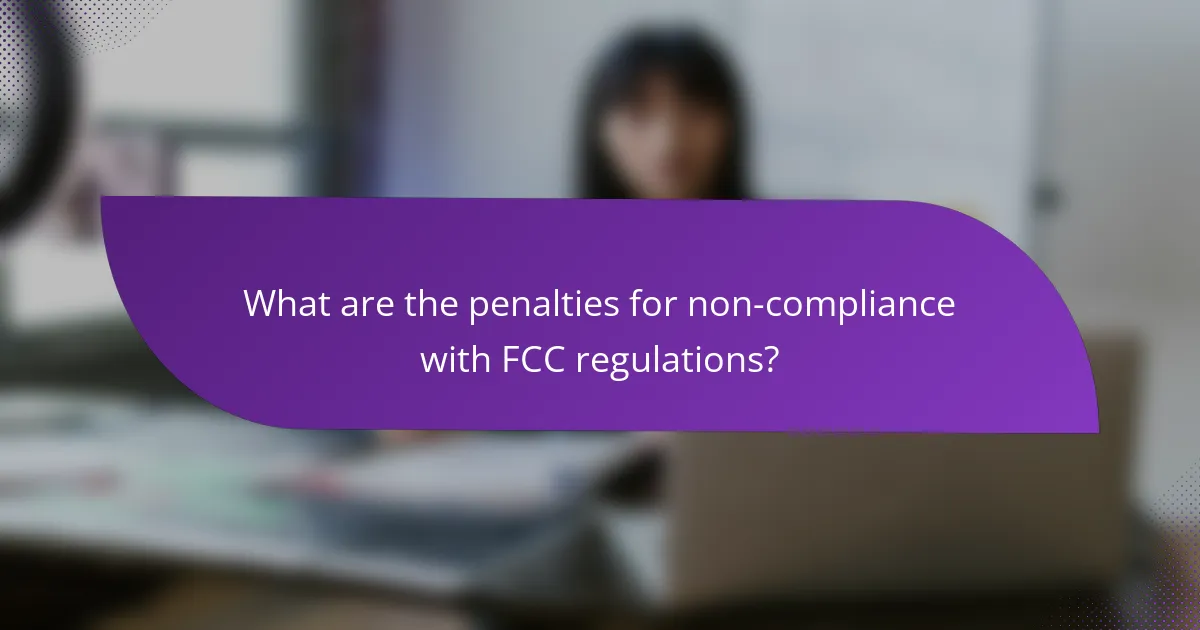
What are the penalties for non-compliance with FCC regulations?
Penalties for non-compliance with FCC regulations can include significant fines, revocation of licenses, and legal actions. These consequences are designed to enforce adherence to communication standards and protect public interest.
Fines and monetary penalties
The FCC can impose fines that vary widely based on the severity of the violation. Monetary penalties can range from a few thousand dollars to several million dollars for egregious offenses. Factors influencing the amount include the nature of the violation, the entity’s history of compliance, and the potential harm caused.
Entities facing fines should consider negotiating with the FCC, as there may be opportunities for reduced penalties through settlement agreements. Timely payment of fines is crucial to avoid additional legal complications.
Revocation of licenses
Non-compliance can lead to the revocation of operating licenses, which is a severe penalty for broadcasters and telecommunications providers. This action effectively halts all operations until compliance is achieved and reinstatement is granted.
To avoid license revocation, companies should maintain thorough records of compliance efforts and promptly address any issues raised by the FCC. Regular audits and proactive communication with the FCC can help mitigate risks.
Legal action and sanctions
The FCC has the authority to initiate legal action against entities that fail to comply with regulations. This can include civil penalties and sanctions that may lead to further legal complications, including court proceedings.
Entities should be aware that repeated violations can lead to more severe sanctions, including criminal charges in extreme cases. Engaging legal counsel familiar with FCC regulations is advisable to navigate potential legal challenges effectively.
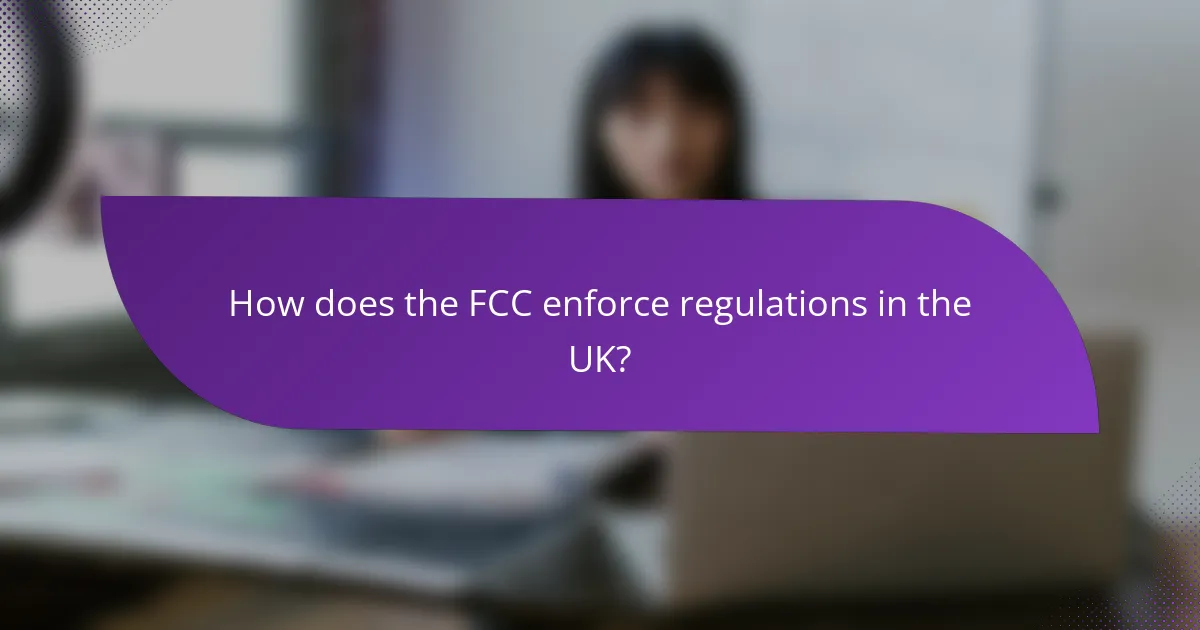
How does the FCC enforce regulations in the UK?
The FCC does not enforce regulations in the UK as it operates primarily within the United States. However, it collaborates with international bodies and local authorities to address cross-border telecommunications issues and ensure compliance with global standards.
Monitoring and surveillance programs
Monitoring and surveillance programs are essential for ensuring compliance with telecommunications regulations. These programs often involve the use of technology to track communications and broadcasting practices, ensuring that operators adhere to established standards. In the UK, local regulatory bodies may implement similar programs to monitor compliance with their specific regulations.
Complaint investigation processes
Complaint investigation processes involve receiving and addressing grievances from consumers or industry stakeholders regarding non-compliance. In the UK, the relevant authorities may investigate complaints about telecommunications services, assessing whether operators meet required standards. This process typically includes gathering evidence, interviewing involved parties, and determining appropriate actions based on findings.
Collaboration with local authorities
Collaboration with local authorities is crucial for effective enforcement of regulations. The FCC may work alongside UK regulatory bodies, such as Ofcom, to share information and best practices. This partnership helps ensure that both US and UK regulations are upheld, particularly in cases involving international telecommunications services.
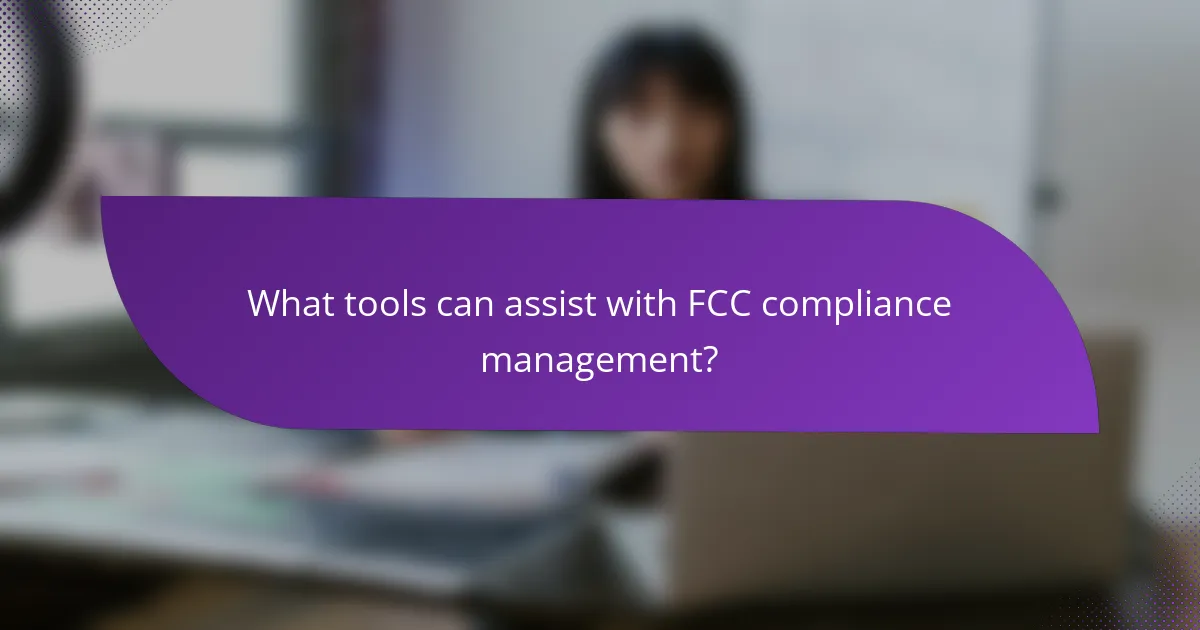
What tools can assist with FCC compliance management?
Several tools can help organizations manage FCC compliance effectively, ensuring adherence to regulations and standards. These tools streamline processes, reduce manual effort, and enhance accuracy in compliance tracking and reporting.
Compliance tracking software
Compliance tracking software is designed to monitor and document adherence to FCC regulations. These systems often include features such as automated alerts for regulatory changes, audit trails, and real-time compliance status updates.
When selecting compliance tracking software, consider factors like user-friendliness, integration capabilities with existing systems, and the ability to generate comprehensive reports. Popular options include tools like ComplyAdvantage and LogicGate, which cater to various industries.
Automated reporting tools
Automated reporting tools simplify the process of generating compliance reports required by the FCC. These tools can pull data from various sources, compile it, and produce reports in the necessary formats, saving time and reducing errors.
Look for reporting tools that offer customizable templates and scheduling features to ensure timely submissions. Examples include Tableau and Microsoft Power BI, which can help visualize compliance data effectively.
Risk assessment platforms
Risk assessment platforms help organizations identify and evaluate potential compliance risks associated with FCC regulations. These tools provide frameworks for assessing vulnerabilities and prioritizing mitigation strategies.
Choose a risk assessment platform that allows for scenario analysis and integrates with your compliance tracking software. Tools like RSA Archer and RiskWatch are popular choices for managing compliance risks in various sectors.
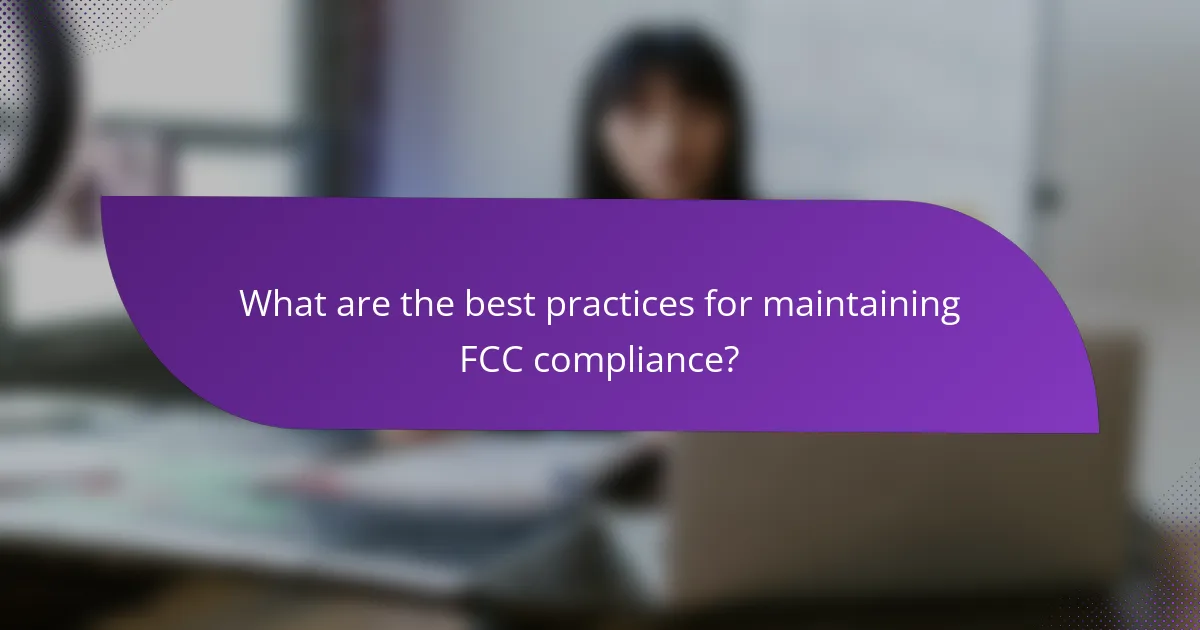
What are the best practices for maintaining FCC compliance?
To maintain FCC compliance, organizations should implement systematic practices that ensure adherence to regulations. This involves regular monitoring, documentation, and updates to processes as regulations evolve.
Documenting compliance processes
Documenting compliance processes is essential for demonstrating adherence to FCC regulations. This documentation should include detailed descriptions of procedures, responsibilities, and timelines for compliance activities.
Key elements to document include equipment testing results, maintenance logs, and any correspondence with the FCC. Regularly updating these records helps maintain accuracy and accountability.
Consider creating a compliance checklist that outlines all necessary steps and documentation required for FCC compliance. This can serve as a practical tool for ensuring that all aspects are covered and can help identify areas needing improvement.
